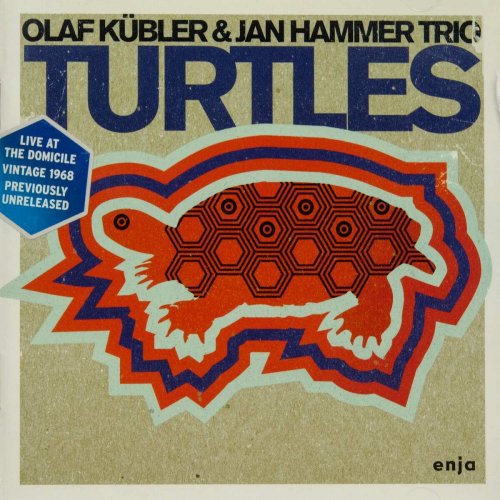
Olaf Kübler, Jan Hammer Trio - Turtles (2018)
BAND/ARTIST: Olaf Kübler, Jan Hammer Trio
- Title: Turtles
- Year Of Release: 2018
- Label: ALFI / Enja
- Genre: Jazz, Hard-Bop, Jazz Fusion, Soul-Jazz, Jazz-Rock
- Quality: FLAC (tracks)
- Total Time: 01:01:23
- Total Size: 380 MB
- WebSite: Album Preview
Tracklist:
1. Blues For Jiri 4:12
2. Turtles 3:33
3. Stella By Starlight 7:44
4. Old Country 6:38
5. Solamente 6:09
6. Cork Screw 7:16
7. For T 5:26
8. Honey Suckle Rose 8:38
9. Sangrita Con Tequila 4:03
10. Let It Go 7:27
1. Blues For Jiri 4:12
2. Turtles 3:33
3. Stella By Starlight 7:44
4. Old Country 6:38
5. Solamente 6:09
6. Cork Screw 7:16
7. For T 5:26
8. Honey Suckle Rose 8:38
9. Sangrita Con Tequila 4:03
10. Let It Go 7:27
Turtles, released in 2007 by German jazz label Enja, was actually recorded live in 1968, at The Domicile, a jazz club in Munich. The band, led by German saxophonist Olaf Kübler, features pianist Jan Hammer, bassist George Mraz, and drummer Cees See -- Hammer and Mraz had just fled from Czechoslovakia and lived at the Domicile, becoming part of the club's house band together with Kübler and See for three months, during which time they played almost every night. What makes this archival release interesting is that it was recorded before the musicians went on to do what they became famous for: the performance took place before Kübler became the manager of underground band Amon Düül and played with the Police, Udo Lindenberg, and Eberhard Schoener; it took place before Jan Hammer became the keyboard wizard in John McLaughlin Mahavishnu Orchestra and composed the Miami Vice theme; and it took place before Mraz played with Oscar Petersen and became one of the most highly regarded jazz bassists. In 1968, this band simply consisted of four newcomers who performed an entertaining jazz set. The group's musicianship is excellent: Hammer is an empathetic accompanist and delivers an intense solo on "Blues for Jiri," Mraz gets several fine solo spots, and Kübler swings effortlessly with his Turrentine-influenced tenor sound. The set mostly sticks to an earthy hard bop style, with several compositions by the group members (Mraz's title tune is especially catchy) mixed with covers (the standard "Stella by Starlight," Turrentine's "Let It Go"), but there are also excursions into bossa nova (Hammer's "Solamente") and free jazz (Kübler's "Cork Screw") -- both popular currents in late-'60s jazz. On two soul-jazz numbers, Hammer switches to Hammond organ, and Michael Dennert replaces See. To make this set even better, the sound quality is excellent -- not only for an almost 40-year-old archival recording. There is nothing earth-shatteringly original to be heard here, and the musicians were still forming their own distinctive voices, but this album is both an interesting look at an early stage in these musicians' careers, and a thoroughly enjoyable recording with excellent performances. It makes you wonder what other gems Kübler's and The Domicile's archives might hold.
Year 2018 | Jazz | Soul | Rock | FLAC / APE
As a ISRA.CLOUD's PREMIUM member you will have the following benefits:
- Unlimited high speed downloads
- Download directly without waiting time
- Unlimited parallel downloads
- Support for download accelerators
- No advertising
- Resume broken downloads


